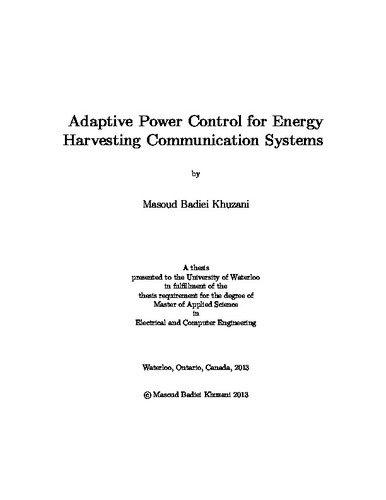| dc.description.abstract | Sustaining energy requirement for wireless devices is the main barrier in building autonomous communication systems and service-free networks. Specifically, in large-scale networks where normally wired energy infrastructures are unavailable, regular battery maintenance for each individual node is inefficient or unfeasible.
To resolve this problem, current and future state of the art technologies are focused on development of perpetual energy resources by harvesting free energy in the environment such as kinetic, thermal, solar, or wind energies. However, the integration of energy harvesting architectures with communication systems requires innovating adaptive transmission power policies.
In this thesis, we investigate the structure of efficient transmission power policies for a multiple access communication system with energy harvesting nodes where the utility function is taken to be the long-term average sum-throughput. We assume a causal structure for energy arrivals and study the problem in the continuous time regime. For this setting, we first characterize a \textit{storage dam} model that captures the dynamics of a battery with energy harvesting and variable transmission power. Using this model, we next establish an upper bound on the throughput problem as a function of battery capacity.
We also formulate a non-linear optimization problem to determine optimal achievable power policies for transmitters. Applying the calculus of variation technique, we derive Euler-Lagrange equations as necessary conditions for optimum power policies in terms of a system of coupled partial integro-differential equations (PIDEs). Based on a Gauss-Seidel algorithm, we then devise an iterative algorithm to solve these equations.
Finally, we propose a fixed-point algorithm for the symmetric multiple access setting in which the statistical descriptions of energy harvesters are identical. To support our iterative algorithms, comprehensive numerical results are also obtained. | en |

